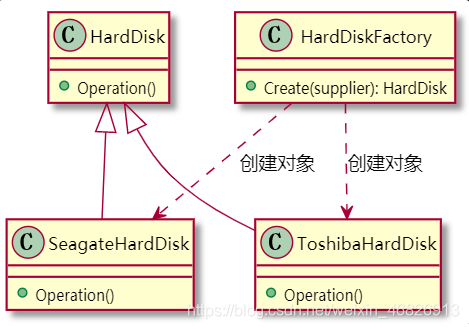C语言 | 简单工厂方法模式实现例子
原文:https://blog.csdn.net/weixin_46826913/article/details/106289647
1、简介
简单工厂方法定义一个用于创建对象的类,该类接受一个参数,通过参数决定创建不同的对象。
GOF并没有把简单工厂方法定义为23种设计模式之一,可以认为简单工厂方法是工厂方法的简化形式。
为了体现简单工厂方法和工厂方法的区别和联系,此处把简单工厂方法先单独讲一下。
2、模拟场景
假设你要生产电脑,电脑由硬盘、内存条、CPU、主板的部件组成。你为了保证供应链可靠,每种部件都选择了至少两家供应商。比如:
硬盘供应商 seagate、Toshiba
内存条供应商 SAMSUNG、Crucial
CPU供应商 intel、AMD
主板供应商 intel、AMD
此处列出多个部件是为了后面讲解工厂方法、抽象工厂方法时使用同一个模拟场景。本章讲简单工厂方法暂时不需要涉及这么多部件,所以仅以硬盘这一个部件为例进行讲解。
3、实现的思路
硬盘就是要创建的对象(即:产品)。为了让不同供应商提供的硬盘可以通用,要定义一个硬盘产品类,并让不同供应商的硬盘都继承硬盘产品类的接口。
还需要定义一个创建硬盘对象的类(即:工厂)。工厂类根据参数决定创建哪家供应商的硬盘对象。
4、实现硬盘对象创建
参与者:
(1)Product: HardDisk 定义硬盘对象的接口
(2)Concrete Product: SeagateHardDisk, ToshibaHardDisk 实现不同供应商的硬盘
(3)SimpleFactory: HardDiskFactory 根据参数,创建不同供应商的硬盘对象
UML:

HardDisk代码示例:
hard_disk.h:
#ifndef HARD_DISK_H
#define HARD_DISK_H
struct HardDisk {
void (*Operation)(struct HardDisk *this);
};
#endif
SeagateHardDisk代码示例:
seagate_hard_disk.h:
#ifndef SEAGATE_HARD_DISK_H
#define SEAGATE_HARD_DISK_H
#include "hard_disk.h"
struct SeagateHardDisk {
struct HardDisk hardDisk;
};
// 构造函数
void SeagateHardDisk(struct SeagateHardDisk *this);
// 析构函数
void _SeagateHardDisk(struct SeagateHardDisk *this);
#endif
seagate_hard_disk.c:
#include "seagate_hard_disk.h"
#include "stdio.h"
void SeagateOperation(struct SeagateHardDisk *this)
{
printf("这是 Seagate 硬盘\n");
}
void SeagateHardDisk(struct SeagateHardDisk *this)
{
this->hardDisk.Operation = (void(*)(struct HardDisk *))SeagateOperation;
}
void _SeagateHardDisk(struct SeagateHardDisk *this)
{
this->hardDisk.Operation = NULL;
}
ToshibaHardDisk代码示例:
toshiba_hard_disk.h:
#ifndef TOSHIBA_HARD_DISK_H
#define TOSHIBA_HARD_DISK_H
#include "hard_disk.h"
struct ToshibaHardDisk {
struct HardDisk hardDisk;
};
// 构造函数
void ToshibaHardDisk(struct ToshibaHardDisk *this);
// 析构函数
void _ToshibaHardDisk(struct ToshibaHardDisk *this);
#endif
toshiba_hard_disk.c:
#include "toshiba_hard_disk.h"
#include "stdio.h"
void ToshibaOperation(struct ToshibaHardDisk *this)
{
printf("这是 Toshiba 硬盘\n");
}
void ToshibaHardDisk(struct ToshibaHardDisk *this)
{
this->hardDisk.Operation = (void(*)(struct HardDisk *))ToshibaOperation;
}
void _ToshibaHardDisk(struct ToshibaHardDisk *this)
{
this->hardDisk.Operation = NULL;
}
HardDiskFactory代码示例:
hard_disk_factory.h:
#ifndef HARD_DISK_FACTORY_H
#define HARD_DISK_FACTORY_H
#include "hard_disk.h"
enum HARD_DISK_SUPPLIER_E {
HARD_DISK_SUPPLIER_SEAGATE,
HARD_DISK_SUPPLIER_TOSHIBA
};
struct HardDiskFactory {
struct HardDisk* (*Create)(struct HardDiskFactory *this,
enum HARD_DISK_SUPPLIER_E supplier);
void (*Destroy)(struct HardDiskFactory *this,
struct HardDisk* hardDisk);
};
// 构造函数
void HardDiskFactory(struct HardDiskFactory *this);
// 析构函数
void _HardDiskFactory(struct HardDiskFactory *this);
#endif
hard_disk_factory.c:
#include "hard_disk_factory.h"
#include "seagate_hard_disk.h"
#include "toshiba_hard_disk.h"
#include "stdio.h"
#include "stdlib.h"
struct HardDisk *Create(struct HardDiskFactory *this,
enum HARD_DISK_SUPPLIER_E supplier)
{
switch (supplier) {
case HARD_DISK_SUPPLIER_SEAGATE:
{
struct SeagateHardDisk *seagateHardDisk = NULL;
if ((seagateHardDisk = malloc(sizeof(struct SeagateHardDisk))) == NULL) {
printf("fail in malloc\n");
return NULL;
}
SeagateHardDisk(seagateHardDisk);
return (struct HardDisk *)seagateHardDisk;
}
case HARD_DISK_SUPPLIER_TOSHIBA:
{
struct ToshibaHardDisk *toshibaHardDisk = NULL;
if ((toshibaHardDisk = malloc(sizeof(struct ToshibaHardDisk))) == NULL) {
printf("fail in malloc\n");
return NULL;
}
ToshibaHardDisk(toshibaHardDisk);
return (struct HardDisk *)toshibaHardDisk;
}
default:
printf("未知的供应商\n");
return NULL;
}
}
void Destroy(struct HardDiskFactory *this, struct HardDisk* hardDisk)
{
if (hardDisk != NULL) {
free(hardDisk);
}
}
// 构造函数
void HardDiskFactory(struct HardDiskFactory *this)
{
this->Create = Create;
this->Destroy = Destroy;
}
// 析构函数
void _HardDiskFactory(struct HardDiskFactory *this)
{
this->Create = NULL;
this->Destroy = NULL;
}
客户端代码示例:
#include "hard_disk.h"
#include "hard_disk_factory.h"
#include "stddef.h"
void main()
{
struct HardDisk *hardDisk = NULL;
struct HardDiskFactory hardDiskFactory;
HardDiskFactory(&hardDiskFactory);
// 创建 seagate 硬盘对象
hardDisk = hardDiskFactory.Create(&hardDiskFactory, HARD_DISK_SUPPLIER_SEAGATE);
// 使用 seagate 硬盘对象
hardDisk->Operation(hardDisk);
// 销毁 seagate 硬盘对象
hardDiskFactory.Destroy(&hardDiskFactory, hardDisk);
// 创建 toshiba 硬盘对象
hardDisk = hardDiskFactory.Create(&hardDiskFactory, HARD_DISK_SUPPLIER_TOSHIBA);
// 使用 seagate 硬盘对象
hardDisk->Operation(hardDisk);
// 销毁 toshiba 硬盘对象
hardDiskFactory.Destroy(&hardDiskFactory, hardDisk);
_HardDiskFactory(&hardDiskFactory);
}
客户端显示示例:
./hard_disk
这是 Seagate 硬盘
这是 Toshiba 硬盘‧‧‧‧‧‧‧‧‧‧‧‧‧‧‧‧ END ‧‧‧‧‧‧‧‧‧‧‧‧‧‧‧‧
